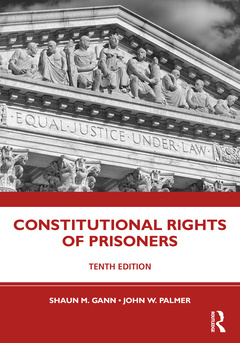Constitutional Rights of Prisoners (10th Ed.)
Auteurs : Gann Shaun M., Palmer John W.

This updated tenth edition covers all aspects of prisoners? rights, including an overview of the judicial system and constitutional law and explanation of specific constitutional issues regarding correctional populations. It also discusses the federal statutes that affect correctional administration and inmates? rights to bring litigation. Accessible and reader-friendly, it provides a practical understanding of how constitutional law affects the day-to-day issues of prisons, jails, and community corrections programs.
The tenth edition includes a thorough update of relevant case law, and new chapters are included that deliver the latest developments on Search, Seizure, and Privacy, Juveniles and Youthful Offenders, and the Death Penalty. Part II contains the Supreme Court syllabi for the significant Court cases relating to the concepts covered.
This updated edition is appropriate as a primary text for undergraduate or graduate-level correctional law and prisoner rights courses within Criminal Justice, Criminology, and Sociology departments. It is also an invaluable reference tool for law students and correctional agencies.
Part I: Correctional Law
1. An Overview of the Judicial System and Correctional Law
2. Religion in Prison
3. Searches, Seizures, and Privacy
4. Rights to Visitation and Association
5. Rights to Use of Mail, Internet, and Telephone
6. Rights to Medical Care and Rehabilitation Programs
7. Prisoner Legal Services
8. Additional Constitutional Issues
9. Isolated Confinement – "The Hole" and Administrative Segregation
10. Prisoner Disciplinary Proceedings
11. Use of Force
12. The Death Penalty
13. Parole and Probation
14. Juvenile and Youthful Offenders
15. Legal Remedies Available to Prisoners
16. Selected Federal Statutes Affecting Prisoners
Index of Cases for Part I
Part II: Supreme Court Decisions Relating to Part I
Appendix I: Constitutional Amendments
Appendix II: Selected Federal Statutes
Shaun M. Gann is an assistant professor in the Department of Criminal Justice at Boise State University. He earned his PhD in Criminal Justice from the University of Cincinnati. He has also worked as a Parole Officer for the Arkansas Department of Community Corrections, where he gained extensive experience in the day-to-day operations of the correctional system. He regularly teaches both undergraduate and graduate-level courses in corrections, including Contemporary Issues in Corrections, Correctional Law, and Correctional Counseling. His research interests include correctional programming and policy; juvenile court decision-making; race and delinquency; and the effects of court decisions on criminal justice policy. He is the coauthor of Correctional Assessment, Casework, and Counseling. He has published research in leading peer-reviewed journals such as Youth Violence & Juvenile Justice, Journal of Developmental and Life Course Criminology, Journal of Crime and Justice, Journal of Juvenile Justice, and Journal of Criminal Justice Education.
John W. Palmer served as a Professor of Law at Capital University Law School for close to 30 years. He earned his JD from University of Michigan Law School in 1962 and continued his education in legal advocacy and languages across his career. In addition to practicing law, Palmer held teaching positions at Concordia International University in Estonia, University of Warsaw, Central European University, International University of Germany, American University in Armenia, and Ohio Dominican University. He was a three-time Fulbright Scholar, at the University of Stockholm, Sweden, 1962–1963; the University of Warsaw, Poland, 2003–2004; and Estonia, 2004. He has been a frequent speaker on Criminal Justice, International Law, and Labor Law in South America and Europe. Throughout his illustrious career, he has amassed a variety of distinguished honors, including the Ohio
Date de parution : 07-2021
17.8x25.4 cm
Date de parution : 07-2021
17.8x25.4 cm
Thèmes de Constitutional Rights of Prisoners :
Mots-clés :
Eighth Amendment; eighth; Prison Officials; amendment; Legitimate Penological Interests; litigation; Due Process Clause; reform; Pretrial Detainees; act35; Mun; due; Deliberate Indifference; process; Liberty Interest; clause; Qualified Immunity; fourteenth; Prison Regulation; district; Eighth Amendment Violation; Prisons; Protected Liberty Interest; Prisoner rights; Prison Litigation Reform Act; Corrections; Fourth Amendment; Prison litigation; Unusual Punishments; Solitary confinement; Good Time Credits; Courts; Administrative Segregation; Parole; Circuit Court; Liability; Prison Disciplinary Proceedings; Supreme Court; Capital Punishment; Use of force; Excessive Force Claim; Prison discipline; Federal Habeas; Disciplinary proceedings; Fourteenth Amendment’s Due Process; Religion; Post Facto; Prison medical care; Disciplinary Segregation; Inmates; Privacy; Search and seizure; Probation; Americans with Disabilities Act
